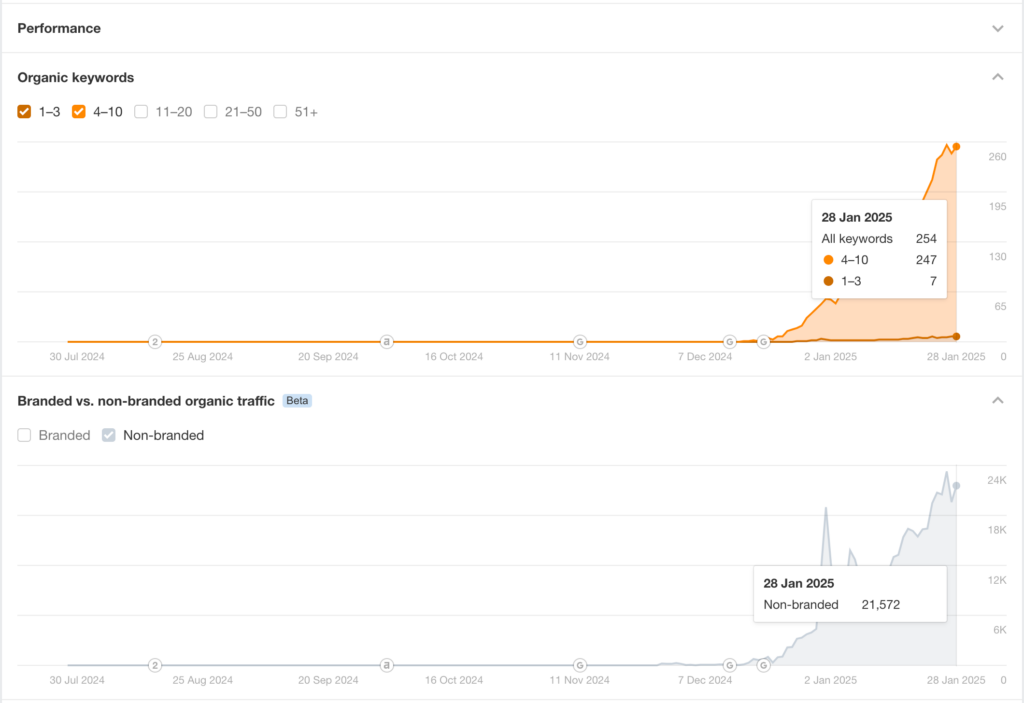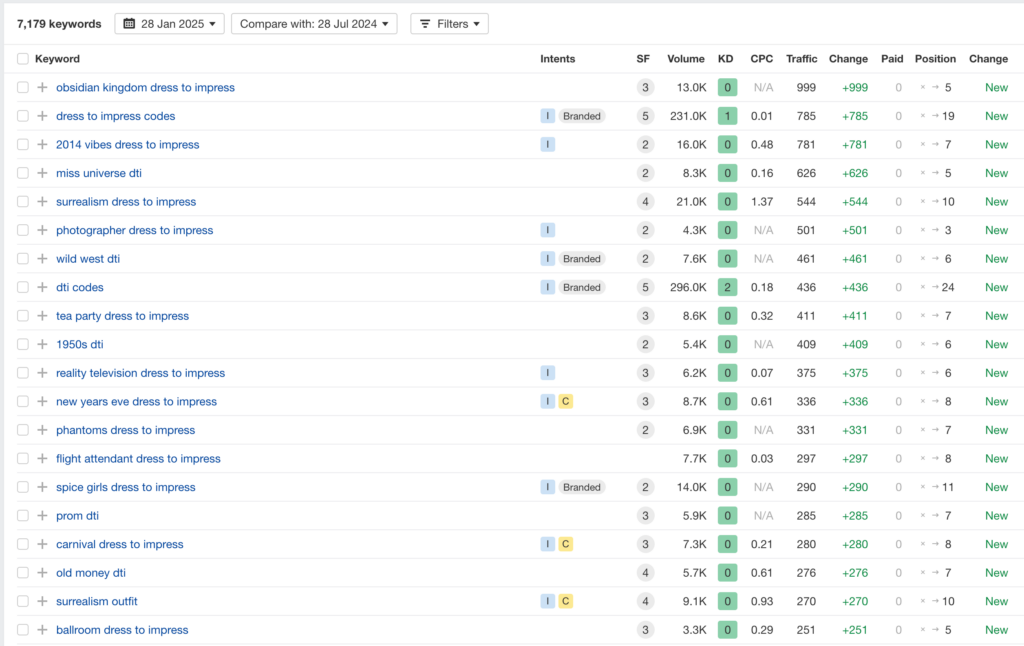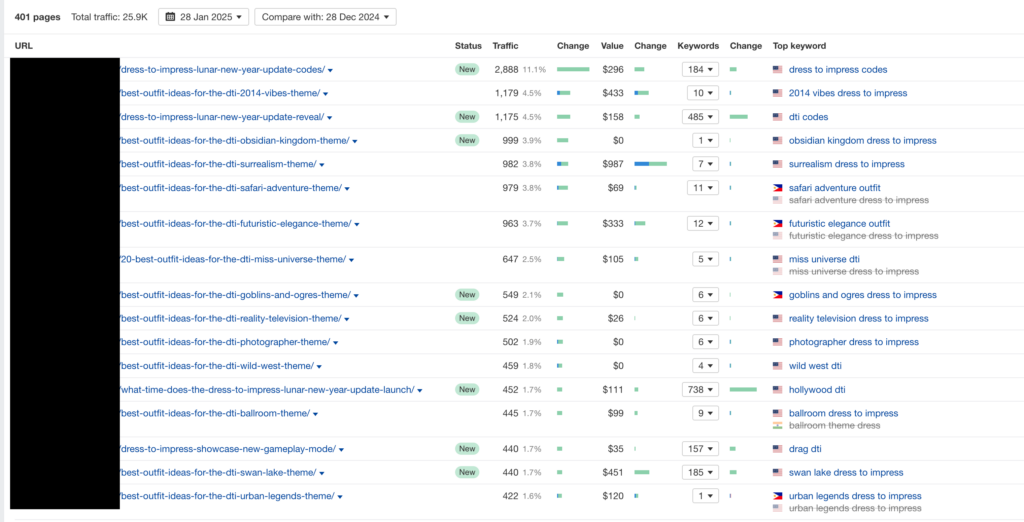SEO is a marathon, not a sprint. While measurable results can emerge in 3–6 months, significant gains often require 6–12+ months of sustained effort.
Realistic Expectations
- Short-Term (1–3 Months): Keyword movement, initial traffic bumps.
- Medium-Term (3–6 Months): Traffic growth for mid-competition terms.
- Long-Term (6–12+ Months): Authority established, competitive rankings achieved.
One good thing that is always smart in my opinion is sharing monthly reports with stakeholders to highlight incremental wins (e.g., “15 keywords entered the top 20”).
You can see results quickly, but you need to target keywords that have low difficulty
Here’s a domain that was registered November 24, 2024 (65 days ago at the time of updating this post) that already has around 21,572 organic search visits per month in two months and ranking on page one for 254 keywords (most of which are in positions 4-10).

Notice how most of the keywords they have visibility for are difficulty of 0-2 according to Ahrefs:

It’s also worth noting that within two months this site has also been creating content at scale, with nearly 400 posts over that time.
So 400 posts over 65 days is about 6 posts per day.
This is likely not sustainable as Google will almost surely catch on but something they’ll see success with since their monetization method is display ads through a network like Mediavine and I’d imagine this isn’t the only site they’re trying to do this with.

It’s also worth noting that they’re using programmatic SEO to drive this visibility. Notice how all of the URLs are tight around a certain topic of ‘best outfit ideas’ (see below; I’ve decided to block the domain to avoid ‘outing’ the website owner, but also didn’t want to make it too difficult for those of you willing to do a few google searches and figure it out. I may change my policy on this in the future but this is what it is for now).

So yes, you can still see results in less than 60 days from SEO if you target keywords that have really low difficulty.
Why SEO Takes Time: Google’s Evaluation Framework
Google’s algorithm assesses websites across five pillars before rewarding rankings:
- Content Relevance: Does your page answer the searcher’s intent?
- User Experience (UX): Is your site fast, mobile-friendly, and easy to navigate?
- Content Quality: Is your content original, well-researched, and authoritative?
- Backlinks: Are reputable sites linking to you?
- Domain Authority: How trustworthy is your site in its niche?
These factors aren’t optimized overnight. Google needs time to crawl, index, and evaluate your site—like a chef slow-cooking a gourmet meal.
What Impacts Your SEO Timeline?
1. Website Age & Authority
- New Sites: Google’s “sandbox” effect can delay rankings for up to a year as trust is built.
- Established Sites: Benefit from existing backlinks and historical data.
2. Competition Level
- Low-Competition Niches (e.g., “SEO vs SEM” with KD 40): Rankings can improve in 2–6 months.
- High-Competition Keywords (e.g., “SEO” with KD 97+): Expect a 12–24+ month grind.
3. Resources & Execution
- Budget & Team Size: More resources = faster content production and link-building.
- Consistency: Regular updates and audits beat sporadic efforts.
4. Strategy Focus
- Quick Wins: Target long-tail keywords (e.g., “best free SEO tools for startups”).
- Long-Term Plays: Build topic clusters and evergreen content.
7 Strategies to Rank Faster
1. Target Low-Competition Keywords
- Why: Less authority needed.
- How: Use Ahrefs/SEMrush to find keywords with KD ≤20 and align with user intent.
Example: “Affordable yoga retreats Bali” vs. “yoga retreats.”
2. Optimize for Featured Snippets
- Why: Bypass higher-ranked pages by claiming “Position 0.”
- How: Structure answers with bullet points, tables, or step-by-step guides.
3. Refresh Old Content
- Why: Google prioritizes fresh, accurate info.
- How: Use tools like Ahrefs to find declining pages. Update stats, examples, and internal links.
Result: HubSpot increased organic traffic by 106% by updating 50 old posts.
4. Master Internal Linking
- Why: Distribute authority and guide crawlers.
- How: Link new posts to cornerstone content (e.g., “Ultimate SEO Guide”).
5. Fix Indexability Issues
- Why: Unindexed pages = invisible rankings.
- Checklist:
- Remove
noindextags. - Submit sitemaps to Google Search Console.
- Fix crawl errors (404s, redirect chains).
- Remove
6. Build High-Quality Backlinks
- Why: Links from .edu or industry sites boost trust.
- Tactic: Use HARO to source expert quotes and earn mentions.
7. Track & Iterate
- Tools: Google Analytics (traffic), Ahrefs (rankings), Screaming Frog (technical audits).
- KPIs:
- Keyword movement (top 20 → top 10).
- Non-branded traffic growth (MoM/YoY).
- Conversion rate (leads, sales).
